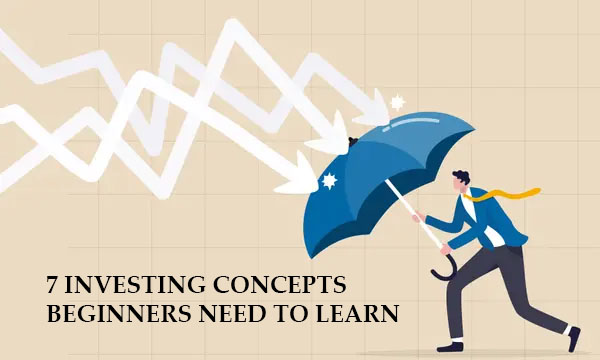As an individual who just started investing you need to have an idea of 7 Investing Concepts Beginners Need to Learn. Also, you need to remember that it is not just about investing but being good and profiting from it, and as you read on you will get a good insight into what has been talked about.
7 Investing Concepts Beginners Need to Learn
Starting as a beginner as an investor can be described as daunting, but some concepts need to be learned to push through. However, having a good plan, prioritizing your savings, and having good investing knowledge on investing is what you should consider first and as you read further you will get to understand the topic more.

Create a Financial Plan
Creating a financial plan with goals and milestones should be the first step in becoming a successful investor. These objectives and benchmarks might include deadlines for saving certain sums of money.
Going further, the objectives in question might be, for instance, having sufficient funds to enable home ownership, supporting your children’s education, creating an emergency fund, having sufficient to fund an entrepreneurial endeavor, or having sufficient to fund a comfortable retirement.
Ensure Costs are Reduced
Although you have no control over future investment returns, you do have control over costs. Moreover, expenses such as transaction fees, management fees for investments, account fees, etc. can greatly impact how well investments perform. Similarly, high cost does not always equate to superior performance, so use mutual funds as just one example.
Checkout: How to Buy a Car with No Credit
Adopt Discipline
Be disciplined if you are investing for the long run with a well-thought-out and well-built financial plan. Also, aim not to get thrilled or shaken by brief market movements and potentially sensationalistic media coverage of the markets that may cause panic.
Moreover, you should take market experts’ predictions with care unless they have a long track record of accurate forecasting that has been objectively validated.
Consider Yourself a Lender or Owner
Stocks are fractional interests in a company and bonds are loans given to the issuer by investors. Also, think like a prospective business owner before you buy a stock, or like a prospective lender before you buy a bond, if you want to be a wise long-term investor rather than a short-term speculator.
Understand Risk
There are many other aspects to investment risk, such as stock market volatility and default risk on bonds which is the risk that the issuer may not fulfill its commitments to pay interest or refund principal, and (which can produce sharp, sudden increases or decreases in value). Also, a tradeoff between risk and reward, or between risk and return, is also generally present. Hence, taking on more risk, including the possibility of losing all or a portion of your investment, is frequently required to get larger returns on your investments.
Don’t Invest in It If You Don’t Understand It
Beginning investors nowadays face a large array of investment options that they may not completely grasp due to the emergence or establishment of complicated and novel investment products as well as businesses with complex and novel business models. Moreso, never make an investment that you do not completely understand, especially in terms of its hazards, and this is a straightforward and wise rule of thumb.
Meanwhile, the implication is to use extreme caution while avoiding investing in fads, as many of them might not endure or continue over time.
Know the Power of Compounding
You may fully benefit from the power of compounding to enhance your wealth if you save and invest on a regular, systematic basis and begin this discipline as early in life as possible. Meanwhile, the current extended period of historically low interest rates has somewhat reduced the power of compounding, but it has also made way to increase the importance of starting early to accumulate savings and wealth because other things are equal. Also, it will take interest-bearing and dividend-paying investments longer to double in value.
Frequently Asked Questions
This section of the article states some frequently asked questions relating to the topic for you to acquire more enlightenment.
What are the 7 rules of investing?
Listed below are the 7 rules of investing.
- Create a plan.
- This is the time to start saving.
- Increase portfolio diversity.
- Lessen fees.
- safeguard against loss.
- Regularly rebalance.
- Neglect the noise.
What is the simplest investment strategy?
The simplest method for obtaining growth may be to just buy and hold investments; over time, it may also prove to be one of the most successful. Also, investors who just purchase growth securities and maintain them in their portfolios with minimal oversight are frequently pleasantly surprised with the outcomes.
Also, see: Best Car Loan Rates
How can I grow money fast in investing?
Below are some of the best ways how you can be able to invest to build lasting wealth.
- Stick EFTs and mutual funds.
- Treasury bills.
- Real estate or REITs.
- Certification of Deposit.
- Money market funds.
- Online savings accounts.
- Low-cost index funds.
What should a beginner investor know?
- Avoid individual stocks as a beginner.
- Be prepared for a downturn.
- Stay committed to your long.
- Avoid short-term trading.
- Buy the right investment.
- Try a stimulator before investing real money.
- Create a diversified portfolio.
